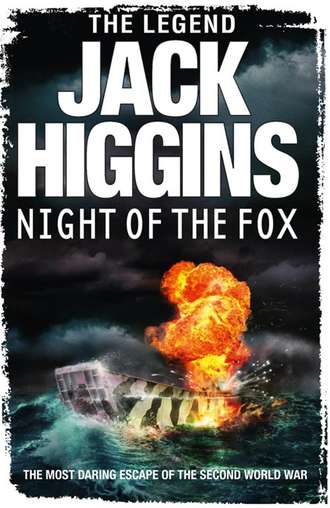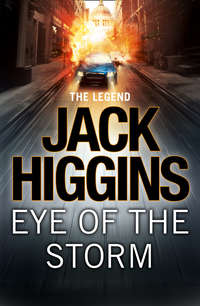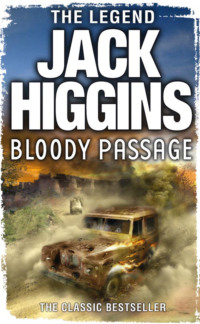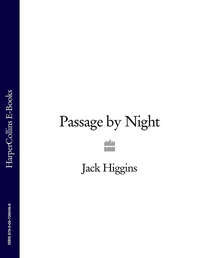
Полная версия
Night of the Fox
‘Where was it taken?’ I asked.
‘In Jersey. Not too far from here. May nineteen forty-four. The tenth, I think.’
‘But I’ve been in Jersey long enough to know that it was occupied by the Germans at that time,’ I said.
‘Very much so.’
‘And Martineau was here? With you?’
She crossed to a Georgian desk, opened a drawer and took out a small folder. When she opened it I saw at once that it contained several old photographs. She passed one to me. ‘This one I don’t keep on top of the piano for obvious reasons.’
She was dressed pretty much as she had. been in the other photo and Martineau wore the same leather trenchcoat. The only difference was the SS uniform underneath, the silver death’s-head badge in his cap. ‘Standartenführer Max Vogel,’ she said. ‘Colonel, to you. He looks rather dashing, doesn’t he?’ She smiled as she took it from me. ‘He had a weakness for uniforms, Harry.’
‘Dear God,’ I said. ‘What is all this?’
She didn’t answer, but simply passed me another photo. It was faded slightly, but still perfectly clear. A group of German officers. In front of them stood two men on their own. One was Martineau in the SS uniform, but it was the other who took my breath away. One of the best-known faces of the Second World War. Field Marshal Erwin Rommel. The Desert Fox himself.
I said, ‘Was that taken here too?’
‘Oh yes.’ She put the photos back in the desk and picked up my glass. ‘I think you could do with another drink.’
‘Yes, I believe I could.’
She got me one, handed the glass to me, and we moved to the fire. She took a cigarette from the box. ‘I should stop, I suppose. Too late now. Another bad habit Harry taught me.’
‘Do I get an explanation?’
‘Why not?’ she said, and turned as rain drummed against the French windows. ‘I can’t think of anything better to do on an afternoon like this, can you?’
2
It started, if one can ever be certain where anything starts, with a telephone call received by Brigadier Dougal Munro at his flat in Haston Place, ten minutes’ walk from the London headquarters of SOE in Baker Street. As head of Section D at SOE he had two phones by his bed, one routed straight through to his office. It was this that brought him awake at four o’clock on the morning of April 28, 1944.
He listened, face grave, then swore softly. ‘I’ll be right over. One thing, check if Eisenhower is in town.’
Within five minutes he was letting himself out of the front door, shivering in the damp cold, lighting the first cigarette of the day as he hurried along the deserted street. He was at that time sixty-five, a squat, powerful-looking man with white hair, his round, ugly face set off by steel-rimmed spectacles. He wore an old Burberry raincoat and carried an umbrella.
There was very little of the military in either his bearing or his appearance, which was hardly surprising. His rank of brigadier was simply to give him the necessary authority in certain quarters. Until 1939, Dougal Munro had been an archaeologist by profession. An Egyptologist, to be more precise, and fellow of All Souls at Oxford. For three years now, head of Section D at SOE. What was commonly referred to in the trade as the dirty tricks department.
He turned in at the entrance of Baker Street, nodded to the night guard and went straight upstairs. When he went into his office, Captain Jack Carter, his night duty officer, was seated behind his desk. Carter had a false leg, a legacy of Dunkirk. He reached for his stick and started to get up.
‘No, stay where you are, Jack,’ Munro told him. ‘Is there any tea?’
‘Thermos flask on the map table, sir.’
Munro unscrewed the flask, poured a cup and drank. ‘God, that’s foul, but at least it’s hot. Right, get on with it.’
Carter now got up and limped across. There was a map of the southwest of England on the table, concentrating mainly on Devon, Cornwall and the general area of the English Channel.
‘Exercise Tiger, sir,’ he said. ‘You remember the details?’
‘Simulated landings for Overlord.’
‘That’s right. Here in Lyme Bay in Devon there’s a place called Slapton Sands. It bears enough similarities to the beach we’ve designated Utah in the Normandy landings to make it invaluable for training purposes. Most of the young Americans going in have no combat experience.’
‘I know that, Jack,’ Munro said. ‘Go on.’
‘Last night’s convoy consisted of eight landing craft. Five from Plymouth and three from Brixham. Under naval escort, of course. They were to do a practice beach landing at Slapton.’
There was a pause. Munro said, ‘Tell me the worst.’
‘They were attacked at sea by German E-boats, we think the Fifth and Ninth Schnellboote Flotillas from Cherbourg.’
‘And the damage?’
‘Two landing craft sunk for certain. Others torpedoed and damaged.’
‘And the butcher’s bill?’
‘Difficult to be accurate at the moment. Around two hundred sailors and four hundred and fifty soldiers.’
Munro said. ‘Are you trying to tell me we lost six hundred and fifty American servicemen last night? Six hundred and fifty and we haven’t even started the invasion of Europe?’
‘I’m afraid so.’
Munro walked restlessly across the room and stood at the window. ‘Has Eisenhower been told?’
‘He’s in town, sir, at Hayes Lodge. He wants to see you at breakfast. Eight o’clock.’
‘And he’ll want the facts.’ Munro turned and went to his desk.
‘Were there any Bigots among those officers lost?’
‘Three, sir.’
‘Dear God, I warned them. I warned them about this,’ Munro said. ‘No Bigot to in any way undertake hazardous duty.’
Some months previously it had become regrettably clear that there were serious breaches of security, in some cases by high-ranking American officers, in connection with the projected invasion of Europe. The Bigot procedure had been brought in as an answer to the situation. It was an intelligence classification above Most Secret. Bigots knew what others did not – the details of the Allied invasion of Europe.
‘The three are missing so far,’ Carter said. ‘I’ve got their files.’
He laid them on the desk and Munro examined them quickly. ‘Stupid,’ he said. ‘Unbelievably stupid. Take this man, Colonel Hugh Kelso.’
‘The engineering officer?’ Carter said. ‘He’s already visited two of the Normandy beaches by night, courtesy of Four Commando, to check on the suitability of the terrain for vehicles.’
‘Sword Beach and Utah Beach.’ Munro groaned. ‘For God’s sake, Jack, what if he was picked up by one of those E-boats? He could be in enemy hands right now. And they’ll make him talk if they want to, you know that.’
‘I don’t think it’s likely that any of those missing were picked up by the Germans, sir. The captain of the destroyer Saladin, which was one of the escorts, said the E-boats attacked at a range of fifteen hundred meters, then got the hell out of it fast. Typical hit and run. A lot of darkness and confusion on both sides. And the weather isn’t too good. Wind force five to six and freshening, but I’m informed that the way the currents are in Lyme Bay, most of the bodies will come ashore. Already started.’
‘Most, Jack, most.’ Munro tapped the map on the table. ‘The Germans know we’re coming. They’re expecting the invasion. They’re ready for it. Hitler’s put Rommel himself in charge of all coastal fortifications. But they don’t know where and they don’t know when.’ He shook his head, staring down at the map. ‘Wouldn’t it be ironic if the greatest invasion in history had to be called off because one man with all the right information fell into the wrong hands.’
‘Not likely, sir, believe me,’ Carter said gently. ‘This Colonel Kelso will come in on the tide with the rest of them.’
‘God help me, but I pray that he does, Jack. I pray that he does,’ Dougal Munro said fervently.
But at that precise moment, Colonel Hugh Kelso was very much alive, more afraid than he had ever been in his life, cold and wet and in terrible pain. He lay huddled in the bottom of a life raft in several inches of water about a mile offshore from the Devon coast, a contrary current carrying him fast toward Start Point on the southernmost tip of Lyme Bay, and beyond Start Point were the open waters of the English Channel.
Kelso was forty-two, married with two daughters. A civil engineer, he had been managing director of the family firm of construction engineers in New York for several years and had a high reputation in the field. Which was why he’d been drafted into the Engineering Corps in 1942 with the immediate rank of major. His experience with the engineering problems involved in beach landings on various islands in the South Pacific had earned him a promotion and a transfer to SHAEF Headquarters in England to work on the preparation for the invasion of Europe.
He’d taken part in Exercise Tiger on the request of the commanding officer for one reason only. The American 1st Engineer Special Brigade was one of the units assigned to take the beach designated as Utah during the coming Normandy landings, and Hugh Kelso had actually visited Utah Beach six weeks previously, under cover of darkness, guarded by British commandos. Slapton Sands was as close to the terrain as they could get. It had seemed sensible to seek his opinion, which was why he’d sailed on LST 31 from Plymouth.
Like everyone on board, Kelso had been taken totally by surprise by the attack. A considerable number of flares had been noticed in the distance which had been assumed to be from British MTBs. And then the first torpedo had struck and the night had become a living hell of burning oil and screaming men. Although Kelso didn’t know it then, 413 men were killed from LST 31 alone. In his own case, he was blown off his feet by the force of the explosion and slammed against a rail, toppling into the water. His life jacket kept him afloat, of course, but he lost consciousness, coming to his senses to find himself being towed through the icy water.
The flames were a hundred yards away and in the reflected light he was aware only of an oil-soaked face.
‘You’re okay, sir. Just hang on. There’s a life raft here.’
The life raft loomed out of the darkness. It was the new model of inflatable developed from Pacific experience. A round, fat orange sphere riding high in the water and intended to carry as many as ten men. There was a canopy on top to protect the occupants from wind and weather, the entrance flap standing open.
‘I’ll get you in, sir, then I’ll go back for some more. Come on, up you go.’
Kelso felt weak, but his unknown friend was strong and muscular. He pushed hard, shoving Kelso in headfirst through the flap. And then Kelso was aware of the pain in his right leg, like a living thing and worse than anything he had ever known. He screamed and fainted.
When he came to, he was numb with cold and it took him a few moments to work out where he was. There was no sign of his unknown friend. He felt around in the darkness, then peered out through the open flap. Spray dashed in his face. There was no light anywhere, only the dark and the wind and the sound of the sea running. He checked the luminous dial of his waterproof watch. It was almost five o’clock and then he remembered that these life rafts carried an emergency kit. As he turned to feel for it, the pain started in his leg again. He gritted his teeth as his hands found the emergency kit box and got the lid open.
There was a waterproof flashlight in a clip on the inside of the lid and he switched it on. He was alone, as he had thought, in the orange cave, about a foot of water slopping around him. His uniform trousers were badly torn below the right knee, and when he put his hand inside gingerly he could feel the raised edges of bone in several places.
There was a Very pistol in the box and he fingered it for a moment. It seemed the obvious thing to send up one of its parachute distress flares, but then he paused, trying to make his tired brain think straight. What if the German naval units that had attacked them were still in the area? What if it was the enemy that picked him up? He couldn’t take that chance. He was, after all, a Bigot. In a matter of weeks an armada of six thousand ships would sail across the narrow waters of the English Channel and Kelso knew time and place. No, better to wait until dawn.
The leg was really hurting now and he rummaged in the box and found the medical kit with its morphine ampules. He jabbed one in his leg and, after a moment’s hesitation, used another. Then he found the bailer and wearily started to throw water out through the open flap. God, but he was tired. Too much morphine perhaps, but at least the pain had dulled and he dropped the bailer and pulled the plastic zip at the entrance and leaned back and was suddenly asleep.
On his right, a few hundred yards away, was Start Point. For a while he seemed to be drifting toward the rocks and then a contrary current pulled him away. Ten minutes later, the life raft passed that final point of land and a freshening wind drove it out into the cold waters of the English Channel.
Eisenhower was seated in the Regency bow window of the library at Hayes Lodge having breakfast of poached eggs, toast and coffee when the young aide showed Dougal Munro in.
‘Leave us, Captain,’ the general said and the aide withdrew. ‘Difficult to smile this morning, Brigadier.’
‘I’m afraid so.’
‘Have you eaten?’
‘I haven’t eaten breakfast for years, General.’
For a moment, Eisenhower’s face was illuminated by that famous and inimitable smile. ‘Which shows you aren’t an old military hand. You prefer tea, don’t you?’
‘Yes, General.’
‘You’ll find it on the sideboard behind you – special order. Help yourself, then tell me what you know of this wretched business. My own people have already given me their version, but I’ve always had considerable respect for your people at SOE, you know that.’
Munro helped himself to the tea and sat in the window seat and gave Eisenhower a brief resume of the night’s events.
‘But surely the naval escorts should have been able to prevent such a thing happening,’ the general said. ‘On the other hand, I hear the weather wasn’t too good. It’s past belief. I visited Slapton myself only three days ago to see how the exercises were going. Went down by special train with Tedder and Omar Bradley.’
‘Most of the crews of your LSTs are new to those waters, and the English Channel at the best of times can be difficult.’ Munro shrugged. ‘We’ve had torpedo boats from the Royal Navy hanging around off Cherbourg regularly during these exercises because Cherbourg, as the General knows, is the most important E-boat base on the French coast. There was a sea mist and the Germans obviously slipped out with their silencers on and probably with their radar sets switched off. They do more than forty knots, those things. Nothing afloat that’s faster and they boxed rather cleverly on their approach. Fired off parachute flares so the people in the convoy assumed they were ours.’
‘Goddammit, you never assume anything in this game. I’m tired of telling people that.’ Eisenhower poured another coffee, stood up and went to the fire. ‘Bodies coming ashore by the hundred, so they tell me.’
‘I’m afraid so.’
‘Needless to say, this whole thing stays under wraps. We’re going to arrange for some kind of mass grave down there in Devon for the time being. At least it’s a defense area under military rule, which should help. If this got out, so close to the invasion, it could have a terrible effect on morale.’
‘I agree.’ Munro hesitated and said carefully, ‘There is the question of the Bigots, General.’
‘Who should never have been there in the first place. No one knows the regulations on Bigots better than you.’
‘It could be worse, sir. There were three in all. Two of the bodies have already been recovered. The third, this man.’ Munro took a file from his briefcase and pushed it across. ‘Is still missing.’
Eisenhower read the file quickly. ‘Colonel Hugh Kelso.’ His face darkened. ‘But I know Kelso personally. He checked out two beaches in Normandy only weeks ago.’
‘Utah and Sword. On those occasions he had commandos nursing him and he also had an L pill with him, just in case he was caught. As the General knows, the cyanide in those things kills instantaneously.’
Eisenhower pushed the file across. ‘He knows, Brigadier, both when we’re going and where. The implications are past belief.’
‘We’ve men on the beaches around Slapton looking for him now, General. I’ve little reason to doubt that his body will turn up with the rest of them.’
‘Don’t try to make me feel good,’ Eisenhower told him sharply. ‘Some of those bodies will never come in on the tide. I know that and so do you, and if Kelso is one of them, we can never be certain that he wasn’t picked up by the enemy.’
‘That’s true, General,’ Munro admitted because there wasn’t really anything else he could say.
Eisenhower walked to the window. Rain dashed against the pane. ‘What a day,’ he said morosely. ‘One thing’s for sure. I can only think of one man who’ll have a smile on his face this morning.’
At that very moment Adolf Hitler was reading a report on the Slapton Sands affair in the map room of his underground headquarters known as Wolf’s Lair, near Rastenburg, deep in the forests of East Prussia.
Most of those important in the Nazi hierarchy were present. Heinrich Himmler, Reichsführer of the SS and Chief of both State and Secret Police, Josef Goebbels, Reichsminister for Propaganda, Reichsleiter Martin Bormann, Secretary to the Führer among other things, and Oberführer Rattenhuber, Himmler’s Chief of Security and Commander of the SS guard at Rastenburg.
Hitler almost danced with delight and crumpled the thin paper of the message in one hand. ‘So, our Navy can still strike, and hard, right in the enemy’s own backyard! Three ships sunk, and hundreds of casualties.’ His eyes sparked. ‘A bad morning for General Eisenhower, gentlemen.’
There was general enthusiasm. ‘Good news indeed, my Führer,’ Goebbels said and delivered his usual high laugh.
Bormann, who had been the first to see the message, said quietly, ‘If we can do this to them off the coast of Devon, my Führer, all things are possible off the coast of France.’
‘They won’t even get ashore,’ Himmler put in.
‘Probably not,’ Hitler said, in high good humor. ‘But now, gentlemen, to the purpose of our meeting.’ They grouped around the circular table and he tapped the large-scale map of France. ‘The Westwall proceeds, I think.’ He turned to Bormann. ‘The report on Army Group B which I asked for? Has it arrived?’
Bormann turned inquiringly to Rattenhuber who said, ‘I’ve just had a report from the airfield. The courier, a Captain Koenig, landed five minutes ago. He’s on his way.’
‘Good.’ Hitler seemed abstracted now, as if somehow alone as he stared down at the map. ‘So, gentlemen, where do we start?’
On December 26, 1943, a remarkable and gifted young German officer, Colonel Klaus von Stauffenberg, reported for a meeting at Rastenburg with a time bomb in his briefcase. Unfortunately, the meeting did not take place, as the Führer had already departed for Bavaria for the Christmas holiday. In spite of having lost his left eye and right hand in action, von Stauffenberg was Chief of Staff to General Olbricht of the General Army Office and the center of a conspiracy of army generals whose aim was to assassinate the Führer and save Germany from disaster.
His own abortive attempt at Christmas 1943 was only one of many that had failed. Yet there was no shortage of volunteers to the cause, as witness Captain Karl Koenig traveling in the rear of the military car from the airfield to Wolf’s Lair on that gray April morning with the papers from Berlin that Hitler had requested. He was in a highly nervous state, which was hardly surprising when one considered the time bomb carefully placed in the false bottom of the briefcase. He had told the pilot at Rastenburg airfield to be ready for a quick turnaround and his fingers trembled as he lit a cigarette.
The SS driver and guard in front stared woodenly ahead, and as time passed, Koenig’s nervousness increased. There were minefields on either side in the gloomy woods, electric fences, guards patrolling everywhere with savage dogs and three gates to pass through to reach the inner compound. Still, time to arm the bomb. Once done, it would give him exactly thirty minutes, they had told him.
He reached for the lock on the left-hand strap of the briefcase and depressed it. There was an immediate and very powerful explosion which killed Koenig and the two guards instantly and blew the car apart.
Hitler was beside himself with rage, pacing up and down in the map room. ‘Again and yet again they try.’ He turned on Rattenhuber. ‘And you, Oberführer? What about you? Sworn to protect my personal safety.’
‘My Führer,’ Rattenhuber stammered. ‘What can I say?’
‘Nothing!’ Hitler stormed and turned on the rest of them. ‘You say nothing of use to me – not any of you.’
In the shocked silence, it was Himmler who spoke, his voice dry and precise. ‘That there has been negligence here is true, my Führer, but surely we see further proof, in the failure of this dastardly attempt, of the certainty of your own destiny. Further proof of Germany’s inevitable victory under your inspired guidance.’
Hitler’s eyes blazed, his head went back. ‘As always, Reichsführer, you see. The only one who does.’ He turned on the others. ‘Get out, all of you. I wish to talk to the Reichsführer alone.’
They went without a murmur, Goebbels the last one to leave. Hitler stood staring down at the map desk, hands clasped behind him. ‘In what way may I serve my Führer?’ Himmler asked.
‘There is a plot, am I not right?’ Hitler said. ‘A general conspiracy to destroy me, and this Captain Koenig was simply an agent?’
‘Not so much a general conspiracy as a conspiracy of generals, my Führer.’
Hitler turned sharply. ‘Are you certain?’
‘Oh, yes, but proof – that is something else.’
Hitler nodded. ‘Koenig was an aide of General Olbricht. Is Olbricht one of those you suspect?’ Himmler nodded. ‘And the others?’
‘Generals Stieff, Wagner, von Hase, Lindemann. Several more, all being closely watched.’
Hitler stayed remarkably cool. ‘Traitors each and every one. No firing squad. A noose each when the time comes. No one higher, though? It would seem our field marshals are loyal at least.’
‘I wish I could confirm that, my Führer, but there is one who is heavily suspect. I would be failing in my duty not to tell you.’
‘Then tell me.’
‘Rommel.’
Hitler smiled a ghastly smile that was almost one of triumph, turned and walked away and turned again, still smiling. ‘I think I expected it. Yes, I’m sure I did. So, the Desert Fox wishes to play games.’
‘I’m almost certain of it.’
‘The people’s hero,’ Hitler said. ‘We must handle him carefully, wouldn’t you say?’
‘Or outfox him, my Führer,’ Himmler said softly.
‘Outfox him. Outfox the Desert Fox.’ Hitler smiled delightedly. ‘Yes, I like that, Reichsführer. I like that very much indeed.’
Hugh Kelso slept until noon and when he awakened, he was sick. He turned over in the violently pitching life raft and pulled down the zip of the entrance flap. His heart sank. There was nothing but sea, the life raft twisting and turning on the angry waves. The sky was black, heavy with rain and the wind was gusting 5 or 6, he could tell that. Worst of all, there wasn’t a hint of land anywhere. He was well out in the English Channel, so much was obvious. If he drifted straight across, wasn’t picked up at all, he’d hit the coast of France, possibly the Cherbourg Peninsula. Below that, in the Gulf of St Malo, were the Channel Islands. Alderney, Guernsey and Jersey. He didn’t know much about them except that they were British and occupied by the enemy. He was not likely to be carried as far south as that, though.









